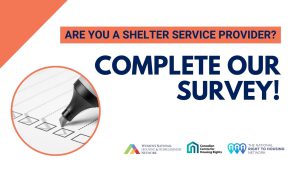Do you work in—or with—a shelter in Canada’s homelessness or gender-based violence sector? We want to hear from you! Take our survey to help design a framework for applying human rights-based and gender-sensitive approaches to emergency shelters.
Across Canada, many women, girls, and gender-diverse people live in insecure or unsafe housing—or are made homeless—due to policy choices. Women and gender-diverse people disproportionately live in core housing need, head single-parent households, and bear the burden of childcare, putting them at risk of eviction when faced with the impossible choice of paying the rent or putting food on the table. There is a severe lack of affordable and appropriate housing that meets the diverse needs of women and gender-diverse people, exacerbated by systemic issues that keep many trapped in poverty and struggling to access adequate housing in overheated rental markets.
For those who do become homeless, they often face overwhelmed emergency shelters. Emergency shelters—including co-ed shelters, gender-specific shelters, and shelters for women fleeing violence—struggle to meet demand because of chronic underfunding and deepening housing need across the country. Certain policies, rules, and practices in emergency shelters also create challenges and exclusions which can lead to people being turned away, separated from their children, or unable to access support.
A question of human rights
These problems raise questions about women and gender-diverse people’s human rights. Now that Canada has legislated its commitment to the right to adequate housing via the National Housing Strategy Act (NHSA), there is an opportunity to ensure that we build and adequately resource an emergency shelter system—across both the homelessness and gender-based violence/violence against women (GBV/VAW) sectors—that is grounded in people’s inherent right to adequate housing. The NHSA requires all levels of government to allocate a “maximum of available resources” to immediately end homelessness, yet the sectors providing emergency provisions barely have enough funds to keep the doors open.
Can this new right to housing legislation transform how we solve the challenges faced by women and gender-diverse people? Can we adopt a human rights-based and gender-sensitive approach to emergency shelters across the country? And what does a rights-based shelter look like, anyway?
Our new Solutions Lab project aims to answer these questions! We at the National Right to Housing Network (NRHN), in collaboration with the Women’s National Housing and Homelessness Network (WNHHN) and the Canadian Centre for Housing Rights (CCHR), are exploring how all emergency shelters can become gender-sensitive and aligned with human rights—while considering what policy changes or investments are needed to make this possible. Funded by the CMHC, our goal is to develop and prototype National Rights-Based, Gender-Sensitive Shelter Standards that will help improve emergency shelter service delivery for women and gender-diverse people (and call for the resources needed to do so).
Service providers: Complete the survey!
As part of our Solutions Lab, we have created a survey to help us understand service providers’ perspectives on applying human rights principles and gender-sensitive approaches within and between emergency shelters across Canada. If you work in or with an emergency shelter in either the homelessness or GBV/VAW sector, we want to hear from you! Help us understand what barriers you face, what information or resources you need, and what you think a “right-based shelter” should look like. We also want to understand how the homelessness and GBV/VAW sectors can better coordinate and collaborate. The survey only takes 5-10 minutes to complete.



